Analysis of Etisalat's Quality Management Systems Implementation
VerifiedAdded on 2021/04/17
|14
|3507
|126
Report
AI Summary
This report provides a comprehensive analysis of Emirates Telecommunications Corporation (Etisalat)'s quality management systems. It begins with an introduction to Etisalat as a telecommunication service provider and an overview of relevant quality management theories and gurus, including Deming's Total Quality Management. The core of the report evaluates Etisalat's quality management systems, particularly focusing on the SunTone certification process for its internet services. The evaluation aligns with applicable quality management theories, highlighting the areas assessed by SunTone, such as service architecture, capacity management, and change management. The report details the implementation method, which involved obtaining SunTone certification and identifies difficulties encountered, including the need to improve ITIL disciplines and transition to ISO20000. The report also explains how Etisalat mitigated these challenges and concludes with recommendations for future improvements, emphasizing the importance of aligning with Deming's theory and addressing areas for improvement. The report utilizes the SunTone audit reports to inform its findings and recommendations.
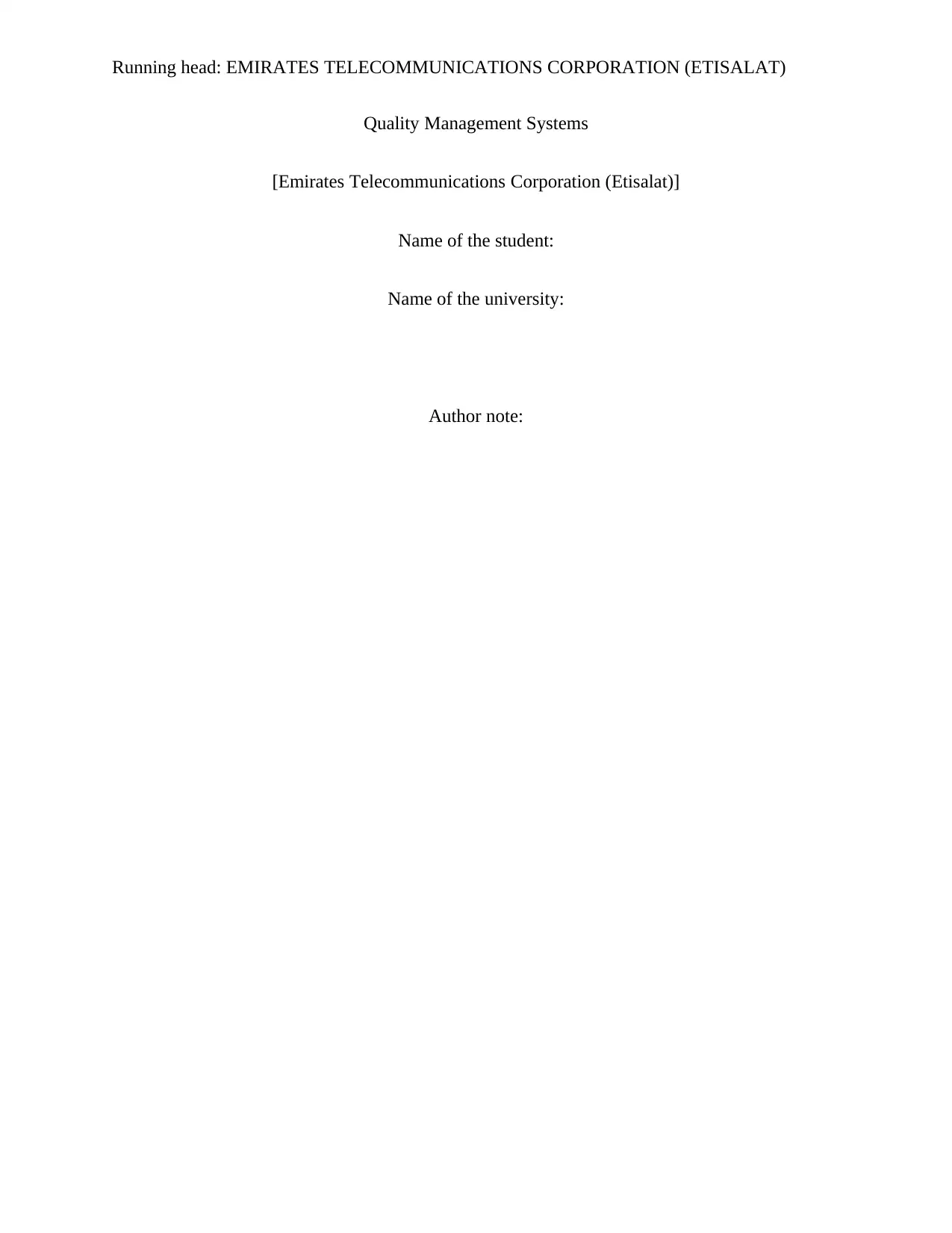
Running head: EMIRATES TELECOMMUNICATIONS CORPORATION (ETISALAT)
Quality Management Systems
[Emirates Telecommunications Corporation (Etisalat)]
Name of the student:
Name of the university:
Author note:
Quality Management Systems
[Emirates Telecommunications Corporation (Etisalat)]
Name of the student:
Name of the university:
Author note:
Paraphrase This Document
Need a fresh take? Get an instant paraphrase of this document with our AI Paraphraser
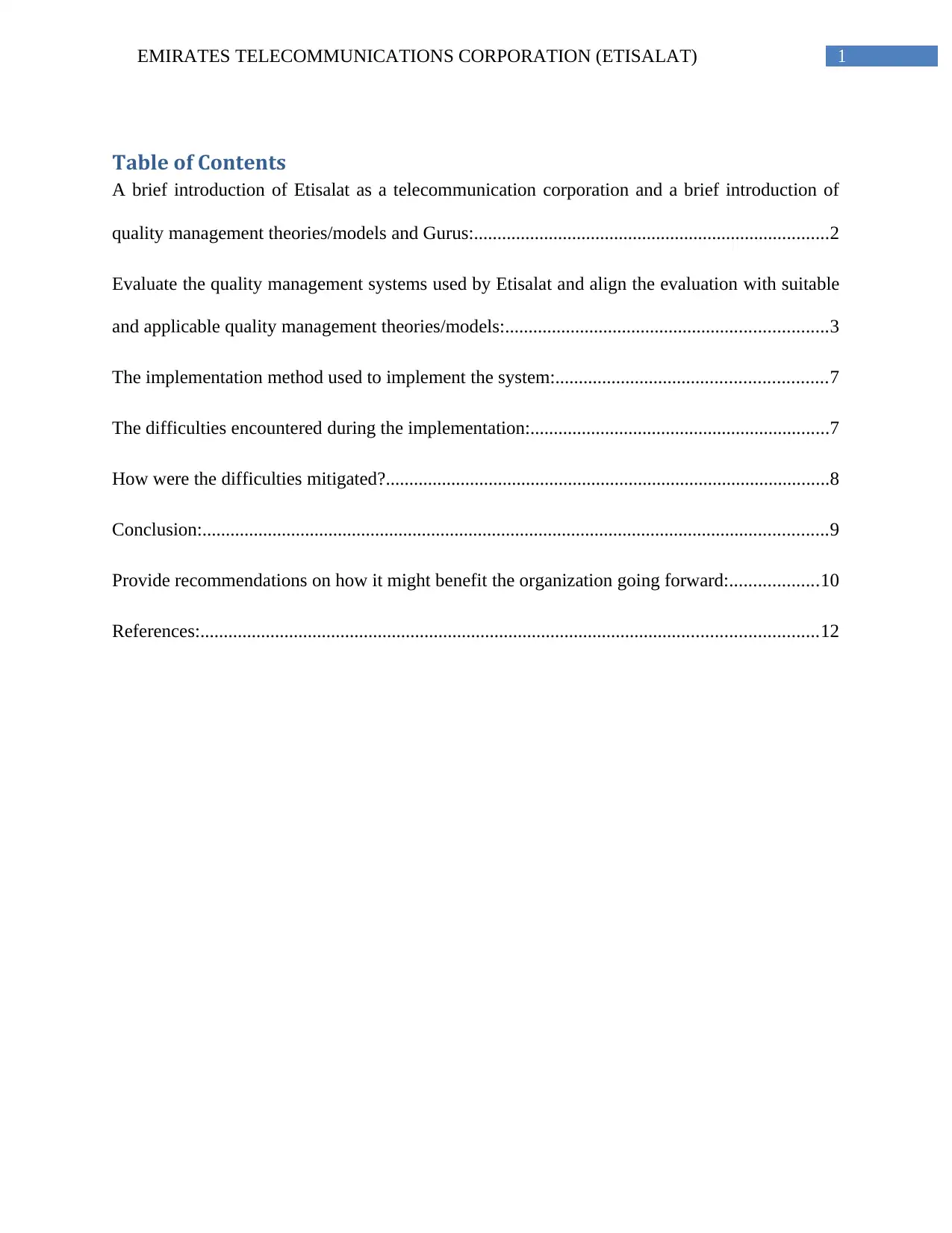
1EMIRATES TELECOMMUNICATIONS CORPORATION (ETISALAT)
Table of Contents
A brief introduction of Etisalat as a telecommunication corporation and a brief introduction of
quality management theories/models and Gurus:............................................................................2
Evaluate the quality management systems used by Etisalat and align the evaluation with suitable
and applicable quality management theories/models:.....................................................................3
The implementation method used to implement the system:..........................................................7
The difficulties encountered during the implementation:................................................................7
How were the difficulties mitigated?...............................................................................................8
Conclusion:......................................................................................................................................9
Provide recommendations on how it might benefit the organization going forward:...................10
References:....................................................................................................................................12
Table of Contents
A brief introduction of Etisalat as a telecommunication corporation and a brief introduction of
quality management theories/models and Gurus:............................................................................2
Evaluate the quality management systems used by Etisalat and align the evaluation with suitable
and applicable quality management theories/models:.....................................................................3
The implementation method used to implement the system:..........................................................7
The difficulties encountered during the implementation:................................................................7
How were the difficulties mitigated?...............................................................................................8
Conclusion:......................................................................................................................................9
Provide recommendations on how it might benefit the organization going forward:...................10
References:....................................................................................................................................12
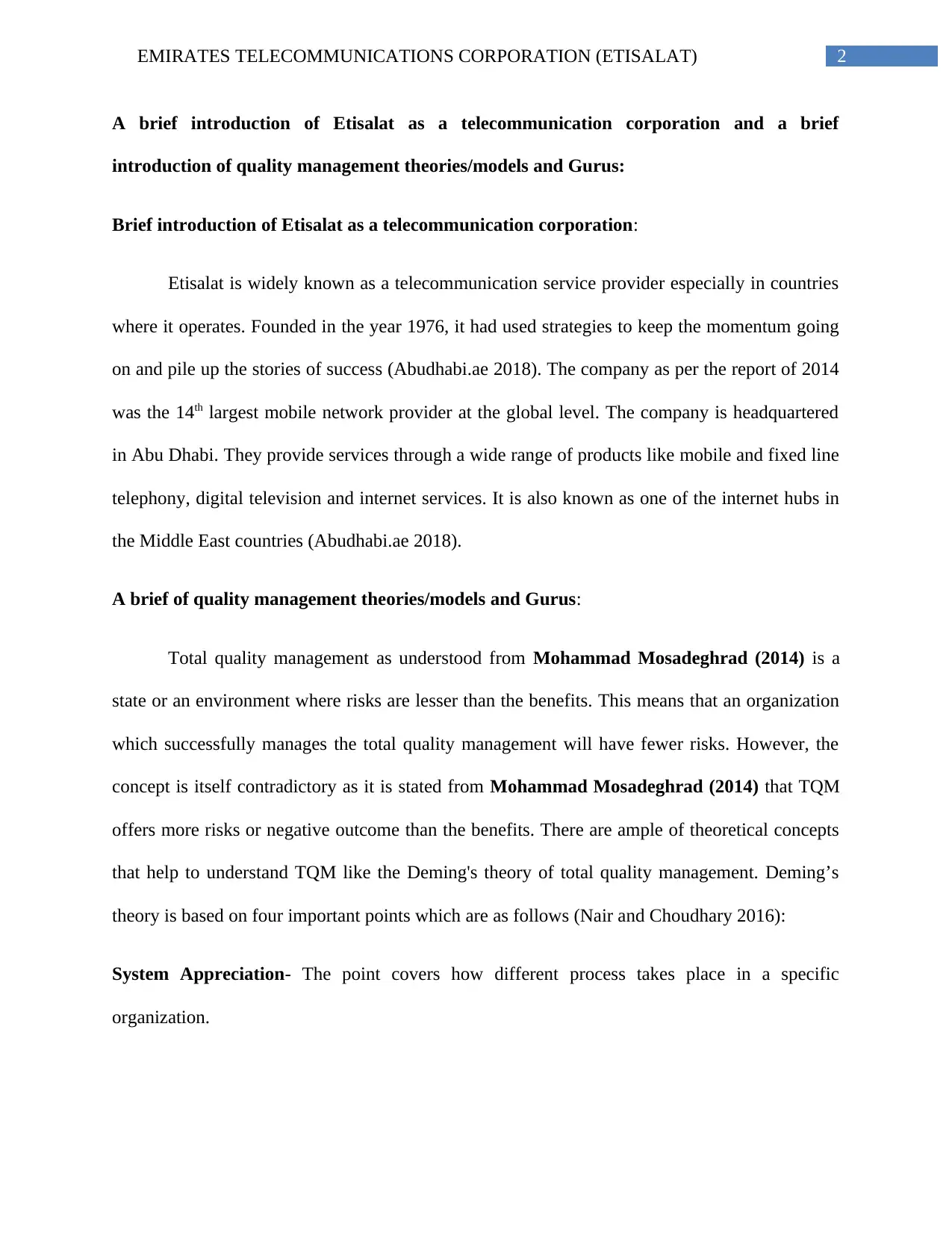
2EMIRATES TELECOMMUNICATIONS CORPORATION (ETISALAT)
A brief introduction of Etisalat as a telecommunication corporation and a brief
introduction of quality management theories/models and Gurus:
Brief introduction of Etisalat as a telecommunication corporation:
Etisalat is widely known as a telecommunication service provider especially in countries
where it operates. Founded in the year 1976, it had used strategies to keep the momentum going
on and pile up the stories of success (Abudhabi.ae 2018). The company as per the report of 2014
was the 14th largest mobile network provider at the global level. The company is headquartered
in Abu Dhabi. They provide services through a wide range of products like mobile and fixed line
telephony, digital television and internet services. It is also known as one of the internet hubs in
the Middle East countries (Abudhabi.ae 2018).
A brief of quality management theories/models and Gurus:
Total quality management as understood from Mohammad Mosadeghrad (2014) is a
state or an environment where risks are lesser than the benefits. This means that an organization
which successfully manages the total quality management will have fewer risks. However, the
concept is itself contradictory as it is stated from Mohammad Mosadeghrad (2014) that TQM
offers more risks or negative outcome than the benefits. There are ample of theoretical concepts
that help to understand TQM like the Deming's theory of total quality management. Deming’s
theory is based on four important points which are as follows (Nair and Choudhary 2016):
System Appreciation- The point covers how different process takes place in a specific
organization.
A brief introduction of Etisalat as a telecommunication corporation and a brief
introduction of quality management theories/models and Gurus:
Brief introduction of Etisalat as a telecommunication corporation:
Etisalat is widely known as a telecommunication service provider especially in countries
where it operates. Founded in the year 1976, it had used strategies to keep the momentum going
on and pile up the stories of success (Abudhabi.ae 2018). The company as per the report of 2014
was the 14th largest mobile network provider at the global level. The company is headquartered
in Abu Dhabi. They provide services through a wide range of products like mobile and fixed line
telephony, digital television and internet services. It is also known as one of the internet hubs in
the Middle East countries (Abudhabi.ae 2018).
A brief of quality management theories/models and Gurus:
Total quality management as understood from Mohammad Mosadeghrad (2014) is a
state or an environment where risks are lesser than the benefits. This means that an organization
which successfully manages the total quality management will have fewer risks. However, the
concept is itself contradictory as it is stated from Mohammad Mosadeghrad (2014) that TQM
offers more risks or negative outcome than the benefits. There are ample of theoretical concepts
that help to understand TQM like the Deming's theory of total quality management. Deming’s
theory is based on four important points which are as follows (Nair and Choudhary 2016):
System Appreciation- The point covers how different process takes place in a specific
organization.
⊘ This is a preview!⊘
Do you want full access?
Subscribe today to unlock all pages.

Trusted by 1+ million students worldwide
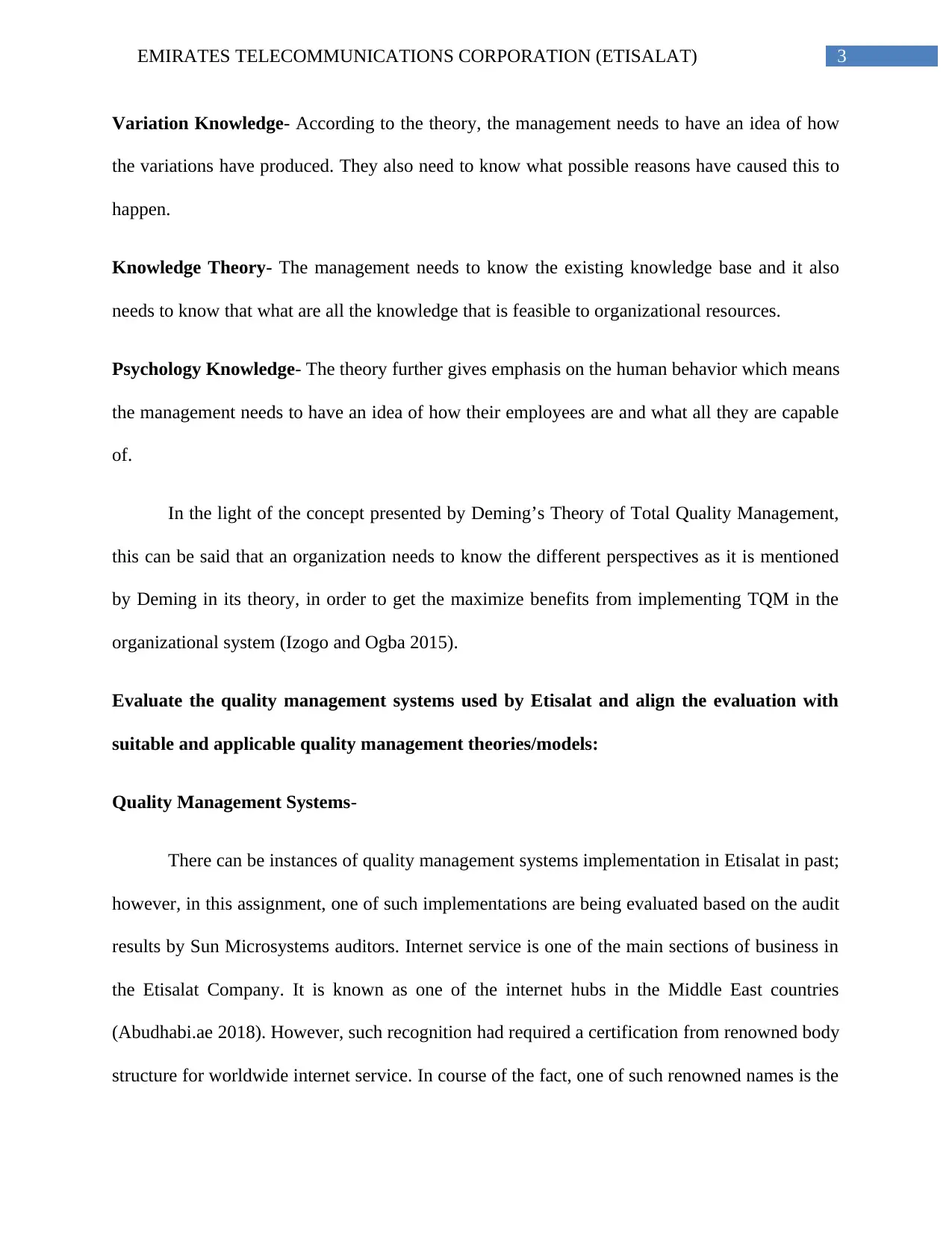
3EMIRATES TELECOMMUNICATIONS CORPORATION (ETISALAT)
Variation Knowledge- According to the theory, the management needs to have an idea of how
the variations have produced. They also need to know what possible reasons have caused this to
happen.
Knowledge Theory- The management needs to know the existing knowledge base and it also
needs to know that what are all the knowledge that is feasible to organizational resources.
Psychology Knowledge- The theory further gives emphasis on the human behavior which means
the management needs to have an idea of how their employees are and what all they are capable
of.
In the light of the concept presented by Deming’s Theory of Total Quality Management,
this can be said that an organization needs to know the different perspectives as it is mentioned
by Deming in its theory, in order to get the maximize benefits from implementing TQM in the
organizational system (Izogo and Ogba 2015).
Evaluate the quality management systems used by Etisalat and align the evaluation with
suitable and applicable quality management theories/models:
Quality Management Systems-
There can be instances of quality management systems implementation in Etisalat in past;
however, in this assignment, one of such implementations are being evaluated based on the audit
results by Sun Microsystems auditors. Internet service is one of the main sections of business in
the Etisalat Company. It is known as one of the internet hubs in the Middle East countries
(Abudhabi.ae 2018). However, such recognition had required a certification from renowned body
structure for worldwide internet service. In course of the fact, one of such renowned names is the
Variation Knowledge- According to the theory, the management needs to have an idea of how
the variations have produced. They also need to know what possible reasons have caused this to
happen.
Knowledge Theory- The management needs to know the existing knowledge base and it also
needs to know that what are all the knowledge that is feasible to organizational resources.
Psychology Knowledge- The theory further gives emphasis on the human behavior which means
the management needs to have an idea of how their employees are and what all they are capable
of.
In the light of the concept presented by Deming’s Theory of Total Quality Management,
this can be said that an organization needs to know the different perspectives as it is mentioned
by Deming in its theory, in order to get the maximize benefits from implementing TQM in the
organizational system (Izogo and Ogba 2015).
Evaluate the quality management systems used by Etisalat and align the evaluation with
suitable and applicable quality management theories/models:
Quality Management Systems-
There can be instances of quality management systems implementation in Etisalat in past;
however, in this assignment, one of such implementations are being evaluated based on the audit
results by Sun Microsystems auditors. Internet service is one of the main sections of business in
the Etisalat Company. It is known as one of the internet hubs in the Middle East countries
(Abudhabi.ae 2018). However, such recognition had required a certification from renowned body
structure for worldwide internet service. In course of the fact, one of such renowned names is the
Paraphrase This Document
Need a fresh take? Get an instant paraphrase of this document with our AI Paraphraser
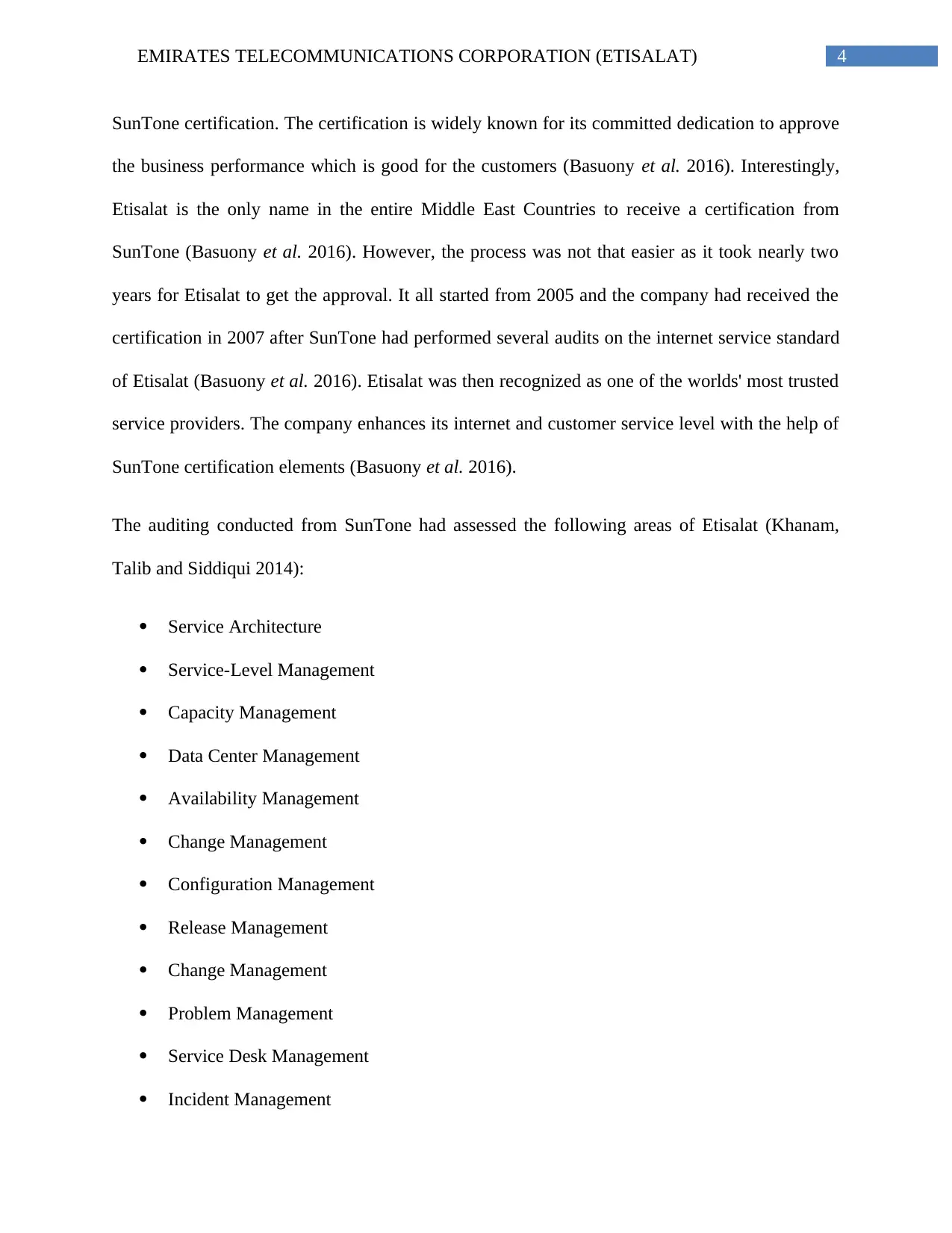
4EMIRATES TELECOMMUNICATIONS CORPORATION (ETISALAT)
SunTone certification. The certification is widely known for its committed dedication to approve
the business performance which is good for the customers (Basuony et al. 2016). Interestingly,
Etisalat is the only name in the entire Middle East Countries to receive a certification from
SunTone (Basuony et al. 2016). However, the process was not that easier as it took nearly two
years for Etisalat to get the approval. It all started from 2005 and the company had received the
certification in 2007 after SunTone had performed several audits on the internet service standard
of Etisalat (Basuony et al. 2016). Etisalat was then recognized as one of the worlds' most trusted
service providers. The company enhances its internet and customer service level with the help of
SunTone certification elements (Basuony et al. 2016).
The auditing conducted from SunTone had assessed the following areas of Etisalat (Khanam,
Talib and Siddiqui 2014):
Service Architecture
Service-Level Management
Capacity Management
Data Center Management
Availability Management
Change Management
Configuration Management
Release Management
Change Management
Problem Management
Service Desk Management
Incident Management
SunTone certification. The certification is widely known for its committed dedication to approve
the business performance which is good for the customers (Basuony et al. 2016). Interestingly,
Etisalat is the only name in the entire Middle East Countries to receive a certification from
SunTone (Basuony et al. 2016). However, the process was not that easier as it took nearly two
years for Etisalat to get the approval. It all started from 2005 and the company had received the
certification in 2007 after SunTone had performed several audits on the internet service standard
of Etisalat (Basuony et al. 2016). Etisalat was then recognized as one of the worlds' most trusted
service providers. The company enhances its internet and customer service level with the help of
SunTone certification elements (Basuony et al. 2016).
The auditing conducted from SunTone had assessed the following areas of Etisalat (Khanam,
Talib and Siddiqui 2014):
Service Architecture
Service-Level Management
Capacity Management
Data Center Management
Availability Management
Change Management
Configuration Management
Release Management
Change Management
Problem Management
Service Desk Management
Incident Management
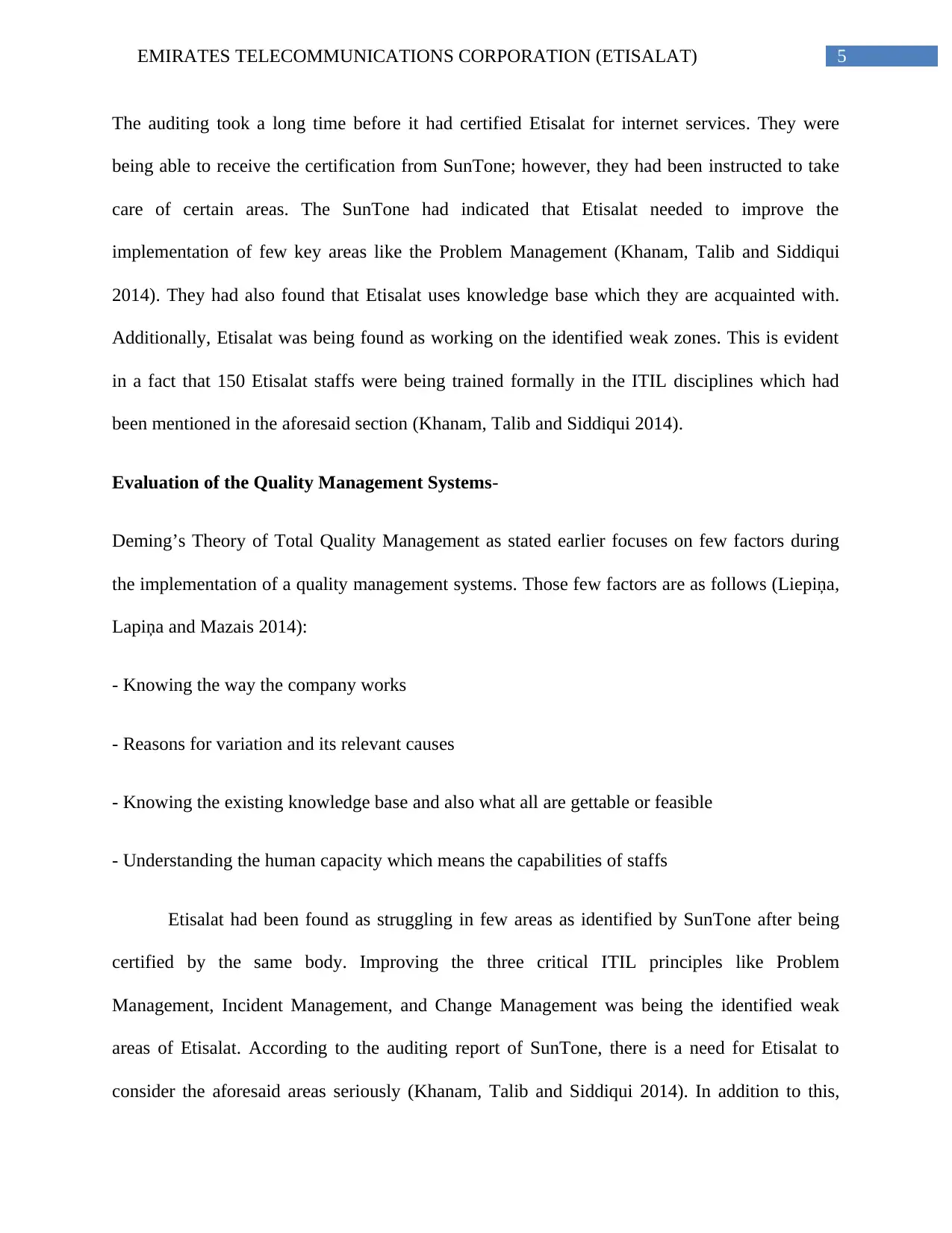
5EMIRATES TELECOMMUNICATIONS CORPORATION (ETISALAT)
The auditing took a long time before it had certified Etisalat for internet services. They were
being able to receive the certification from SunTone; however, they had been instructed to take
care of certain areas. The SunTone had indicated that Etisalat needed to improve the
implementation of few key areas like the Problem Management (Khanam, Talib and Siddiqui
2014). They had also found that Etisalat uses knowledge base which they are acquainted with.
Additionally, Etisalat was being found as working on the identified weak zones. This is evident
in a fact that 150 Etisalat staffs were being trained formally in the ITIL disciplines which had
been mentioned in the aforesaid section (Khanam, Talib and Siddiqui 2014).
Evaluation of the Quality Management Systems-
Deming’s Theory of Total Quality Management as stated earlier focuses on few factors during
the implementation of a quality management systems. Those few factors are as follows (Liepiņa,
Lapiņa and Mazais 2014):
- Knowing the way the company works
- Reasons for variation and its relevant causes
- Knowing the existing knowledge base and also what all are gettable or feasible
- Understanding the human capacity which means the capabilities of staffs
Etisalat had been found as struggling in few areas as identified by SunTone after being
certified by the same body. Improving the three critical ITIL principles like Problem
Management, Incident Management, and Change Management was being the identified weak
areas of Etisalat. According to the auditing report of SunTone, there is a need for Etisalat to
consider the aforesaid areas seriously (Khanam, Talib and Siddiqui 2014). In addition to this,
The auditing took a long time before it had certified Etisalat for internet services. They were
being able to receive the certification from SunTone; however, they had been instructed to take
care of certain areas. The SunTone had indicated that Etisalat needed to improve the
implementation of few key areas like the Problem Management (Khanam, Talib and Siddiqui
2014). They had also found that Etisalat uses knowledge base which they are acquainted with.
Additionally, Etisalat was being found as working on the identified weak zones. This is evident
in a fact that 150 Etisalat staffs were being trained formally in the ITIL disciplines which had
been mentioned in the aforesaid section (Khanam, Talib and Siddiqui 2014).
Evaluation of the Quality Management Systems-
Deming’s Theory of Total Quality Management as stated earlier focuses on few factors during
the implementation of a quality management systems. Those few factors are as follows (Liepiņa,
Lapiņa and Mazais 2014):
- Knowing the way the company works
- Reasons for variation and its relevant causes
- Knowing the existing knowledge base and also what all are gettable or feasible
- Understanding the human capacity which means the capabilities of staffs
Etisalat had been found as struggling in few areas as identified by SunTone after being
certified by the same body. Improving the three critical ITIL principles like Problem
Management, Incident Management, and Change Management was being the identified weak
areas of Etisalat. According to the auditing report of SunTone, there is a need for Etisalat to
consider the aforesaid areas seriously (Khanam, Talib and Siddiqui 2014). In addition to this,
⊘ This is a preview!⊘
Do you want full access?
Subscribe today to unlock all pages.

Trusted by 1+ million students worldwide
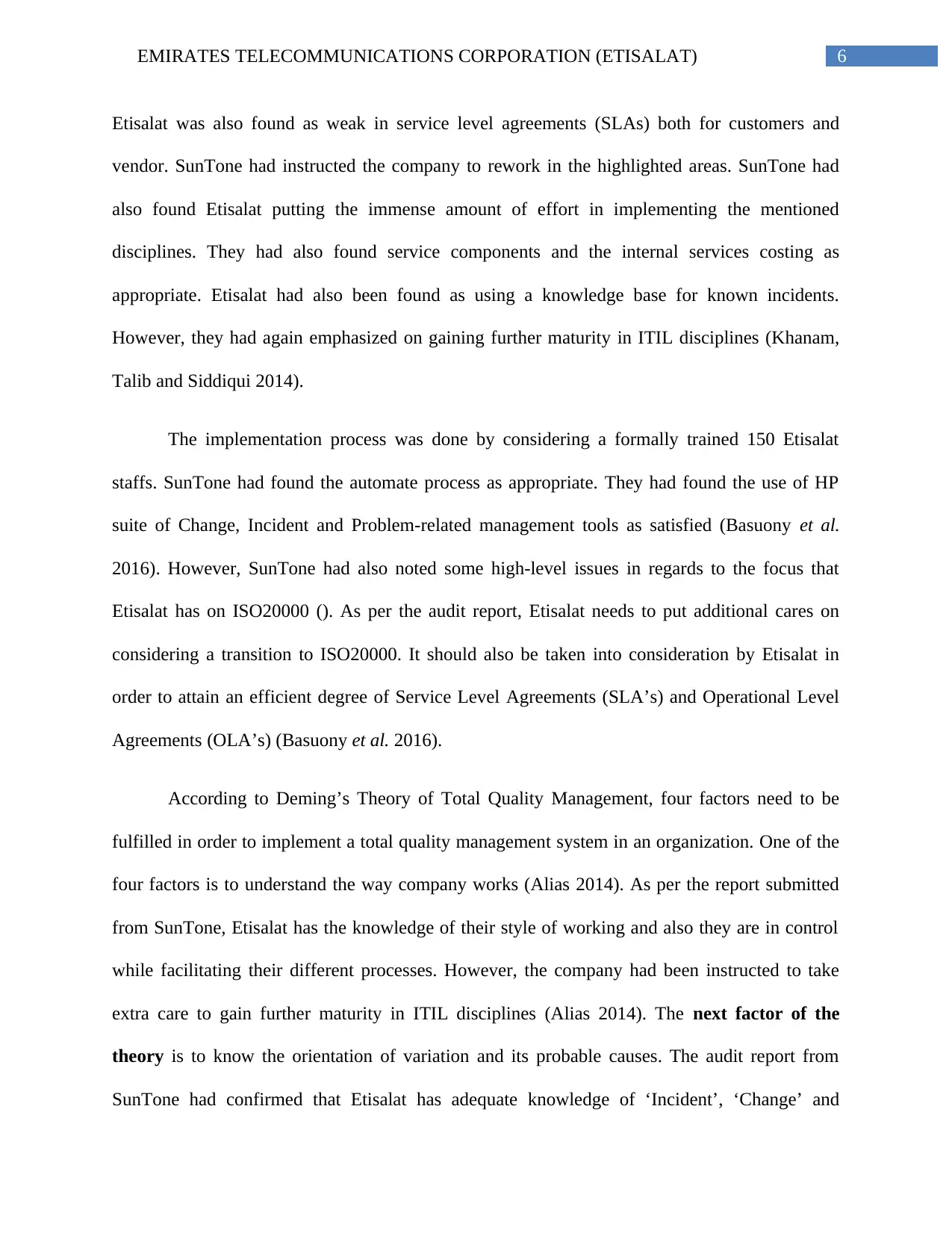
6EMIRATES TELECOMMUNICATIONS CORPORATION (ETISALAT)
Etisalat was also found as weak in service level agreements (SLAs) both for customers and
vendor. SunTone had instructed the company to rework in the highlighted areas. SunTone had
also found Etisalat putting the immense amount of effort in implementing the mentioned
disciplines. They had also found service components and the internal services costing as
appropriate. Etisalat had also been found as using a knowledge base for known incidents.
However, they had again emphasized on gaining further maturity in ITIL disciplines (Khanam,
Talib and Siddiqui 2014).
The implementation process was done by considering a formally trained 150 Etisalat
staffs. SunTone had found the automate process as appropriate. They had found the use of HP
suite of Change, Incident and Problem-related management tools as satisfied (Basuony et al.
2016). However, SunTone had also noted some high-level issues in regards to the focus that
Etisalat has on ISO20000 (). As per the audit report, Etisalat needs to put additional cares on
considering a transition to ISO20000. It should also be taken into consideration by Etisalat in
order to attain an efficient degree of Service Level Agreements (SLA’s) and Operational Level
Agreements (OLA’s) (Basuony et al. 2016).
According to Deming’s Theory of Total Quality Management, four factors need to be
fulfilled in order to implement a total quality management system in an organization. One of the
four factors is to understand the way company works (Alias 2014). As per the report submitted
from SunTone, Etisalat has the knowledge of their style of working and also they are in control
while facilitating their different processes. However, the company had been instructed to take
extra care to gain further maturity in ITIL disciplines (Alias 2014). The next factor of the
theory is to know the orientation of variation and its probable causes. The audit report from
SunTone had confirmed that Etisalat has adequate knowledge of ‘Incident’, ‘Change’ and
Etisalat was also found as weak in service level agreements (SLAs) both for customers and
vendor. SunTone had instructed the company to rework in the highlighted areas. SunTone had
also found Etisalat putting the immense amount of effort in implementing the mentioned
disciplines. They had also found service components and the internal services costing as
appropriate. Etisalat had also been found as using a knowledge base for known incidents.
However, they had again emphasized on gaining further maturity in ITIL disciplines (Khanam,
Talib and Siddiqui 2014).
The implementation process was done by considering a formally trained 150 Etisalat
staffs. SunTone had found the automate process as appropriate. They had found the use of HP
suite of Change, Incident and Problem-related management tools as satisfied (Basuony et al.
2016). However, SunTone had also noted some high-level issues in regards to the focus that
Etisalat has on ISO20000 (). As per the audit report, Etisalat needs to put additional cares on
considering a transition to ISO20000. It should also be taken into consideration by Etisalat in
order to attain an efficient degree of Service Level Agreements (SLA’s) and Operational Level
Agreements (OLA’s) (Basuony et al. 2016).
According to Deming’s Theory of Total Quality Management, four factors need to be
fulfilled in order to implement a total quality management system in an organization. One of the
four factors is to understand the way company works (Alias 2014). As per the report submitted
from SunTone, Etisalat has the knowledge of their style of working and also they are in control
while facilitating their different processes. However, the company had been instructed to take
extra care to gain further maturity in ITIL disciplines (Alias 2014). The next factor of the
theory is to know the orientation of variation and its probable causes. The audit report from
SunTone had confirmed that Etisalat has adequate knowledge of ‘Incident’, ‘Change’ and
Paraphrase This Document
Need a fresh take? Get an instant paraphrase of this document with our AI Paraphraser
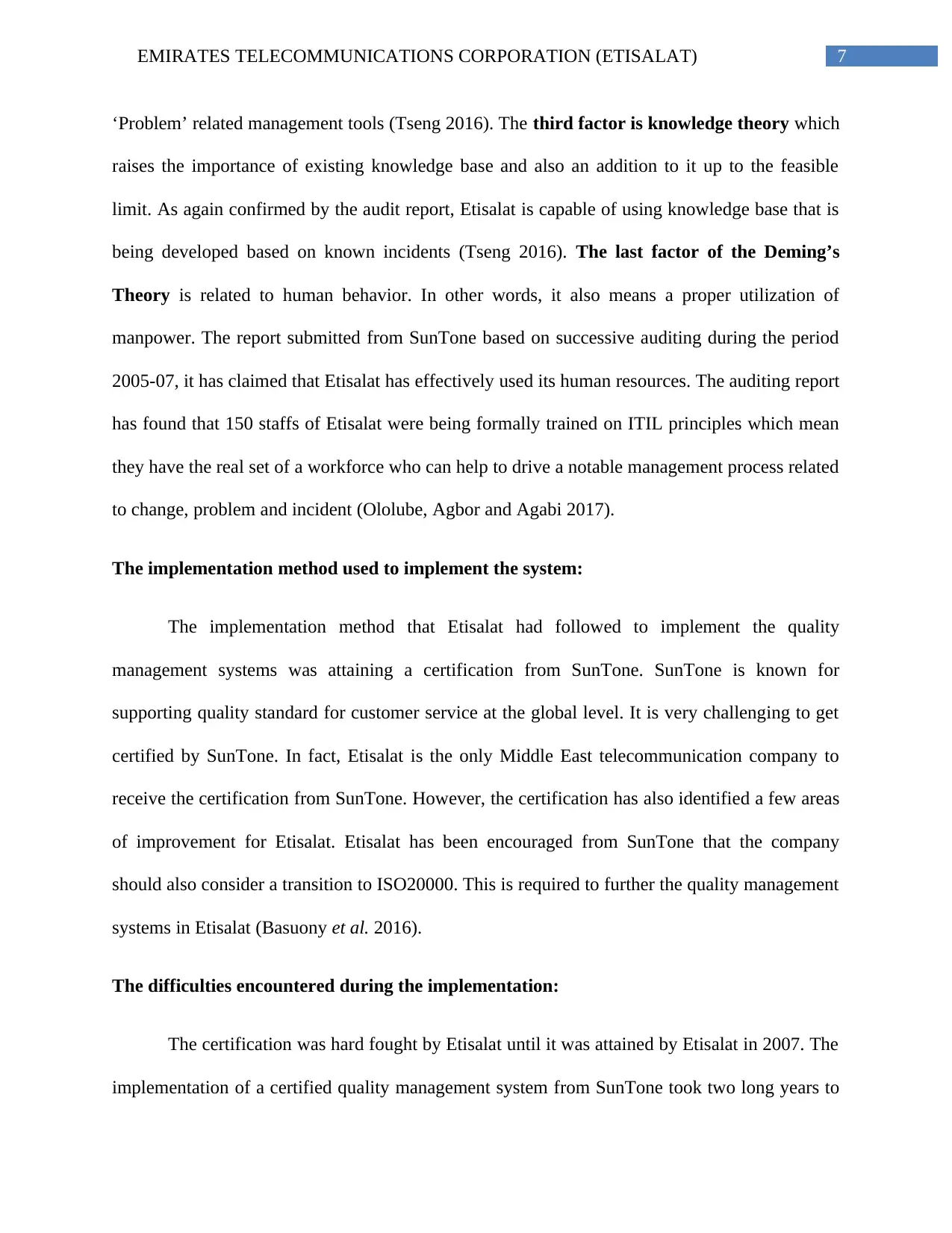
7EMIRATES TELECOMMUNICATIONS CORPORATION (ETISALAT)
‘Problem’ related management tools (Tseng 2016). The third factor is knowledge theory which
raises the importance of existing knowledge base and also an addition to it up to the feasible
limit. As again confirmed by the audit report, Etisalat is capable of using knowledge base that is
being developed based on known incidents (Tseng 2016). The last factor of the Deming’s
Theory is related to human behavior. In other words, it also means a proper utilization of
manpower. The report submitted from SunTone based on successive auditing during the period
2005-07, it has claimed that Etisalat has effectively used its human resources. The auditing report
has found that 150 staffs of Etisalat were being formally trained on ITIL principles which mean
they have the real set of a workforce who can help to drive a notable management process related
to change, problem and incident (Ololube, Agbor and Agabi 2017).
The implementation method used to implement the system:
The implementation method that Etisalat had followed to implement the quality
management systems was attaining a certification from SunTone. SunTone is known for
supporting quality standard for customer service at the global level. It is very challenging to get
certified by SunTone. In fact, Etisalat is the only Middle East telecommunication company to
receive the certification from SunTone. However, the certification has also identified a few areas
of improvement for Etisalat. Etisalat has been encouraged from SunTone that the company
should also consider a transition to ISO20000. This is required to further the quality management
systems in Etisalat (Basuony et al. 2016).
The difficulties encountered during the implementation:
The certification was hard fought by Etisalat until it was attained by Etisalat in 2007. The
implementation of a certified quality management system from SunTone took two long years to
‘Problem’ related management tools (Tseng 2016). The third factor is knowledge theory which
raises the importance of existing knowledge base and also an addition to it up to the feasible
limit. As again confirmed by the audit report, Etisalat is capable of using knowledge base that is
being developed based on known incidents (Tseng 2016). The last factor of the Deming’s
Theory is related to human behavior. In other words, it also means a proper utilization of
manpower. The report submitted from SunTone based on successive auditing during the period
2005-07, it has claimed that Etisalat has effectively used its human resources. The auditing report
has found that 150 staffs of Etisalat were being formally trained on ITIL principles which mean
they have the real set of a workforce who can help to drive a notable management process related
to change, problem and incident (Ololube, Agbor and Agabi 2017).
The implementation method used to implement the system:
The implementation method that Etisalat had followed to implement the quality
management systems was attaining a certification from SunTone. SunTone is known for
supporting quality standard for customer service at the global level. It is very challenging to get
certified by SunTone. In fact, Etisalat is the only Middle East telecommunication company to
receive the certification from SunTone. However, the certification has also identified a few areas
of improvement for Etisalat. Etisalat has been encouraged from SunTone that the company
should also consider a transition to ISO20000. This is required to further the quality management
systems in Etisalat (Basuony et al. 2016).
The difficulties encountered during the implementation:
The certification was hard fought by Etisalat until it was attained by Etisalat in 2007. The
implementation of a certified quality management system from SunTone took two long years to
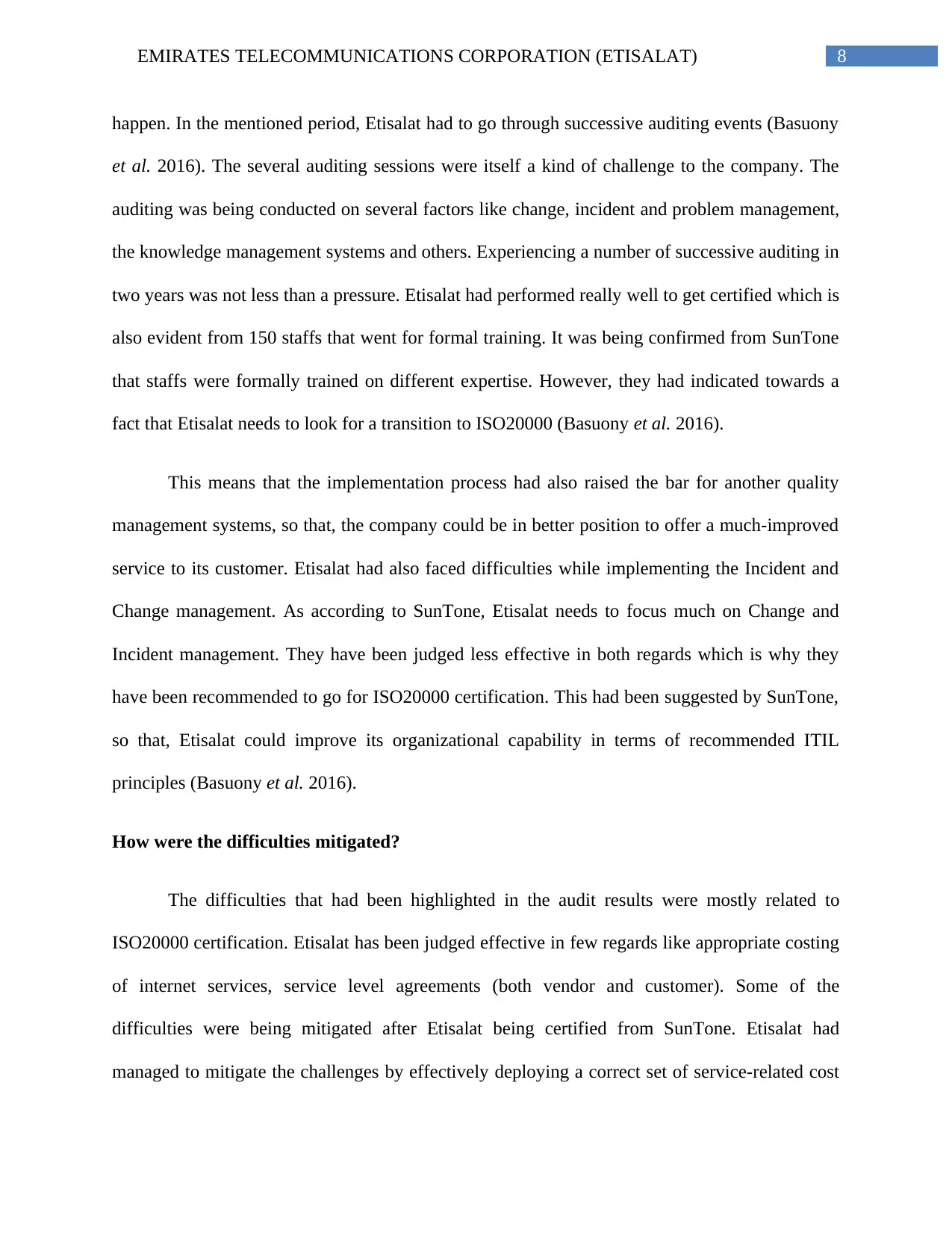
8EMIRATES TELECOMMUNICATIONS CORPORATION (ETISALAT)
happen. In the mentioned period, Etisalat had to go through successive auditing events (Basuony
et al. 2016). The several auditing sessions were itself a kind of challenge to the company. The
auditing was being conducted on several factors like change, incident and problem management,
the knowledge management systems and others. Experiencing a number of successive auditing in
two years was not less than a pressure. Etisalat had performed really well to get certified which is
also evident from 150 staffs that went for formal training. It was being confirmed from SunTone
that staffs were formally trained on different expertise. However, they had indicated towards a
fact that Etisalat needs to look for a transition to ISO20000 (Basuony et al. 2016).
This means that the implementation process had also raised the bar for another quality
management systems, so that, the company could be in better position to offer a much-improved
service to its customer. Etisalat had also faced difficulties while implementing the Incident and
Change management. As according to SunTone, Etisalat needs to focus much on Change and
Incident management. They have been judged less effective in both regards which is why they
have been recommended to go for ISO20000 certification. This had been suggested by SunTone,
so that, Etisalat could improve its organizational capability in terms of recommended ITIL
principles (Basuony et al. 2016).
How were the difficulties mitigated?
The difficulties that had been highlighted in the audit results were mostly related to
ISO20000 certification. Etisalat has been judged effective in few regards like appropriate costing
of internet services, service level agreements (both vendor and customer). Some of the
difficulties were being mitigated after Etisalat being certified from SunTone. Etisalat had
managed to mitigate the challenges by effectively deploying a correct set of service-related cost
happen. In the mentioned period, Etisalat had to go through successive auditing events (Basuony
et al. 2016). The several auditing sessions were itself a kind of challenge to the company. The
auditing was being conducted on several factors like change, incident and problem management,
the knowledge management systems and others. Experiencing a number of successive auditing in
two years was not less than a pressure. Etisalat had performed really well to get certified which is
also evident from 150 staffs that went for formal training. It was being confirmed from SunTone
that staffs were formally trained on different expertise. However, they had indicated towards a
fact that Etisalat needs to look for a transition to ISO20000 (Basuony et al. 2016).
This means that the implementation process had also raised the bar for another quality
management systems, so that, the company could be in better position to offer a much-improved
service to its customer. Etisalat had also faced difficulties while implementing the Incident and
Change management. As according to SunTone, Etisalat needs to focus much on Change and
Incident management. They have been judged less effective in both regards which is why they
have been recommended to go for ISO20000 certification. This had been suggested by SunTone,
so that, Etisalat could improve its organizational capability in terms of recommended ITIL
principles (Basuony et al. 2016).
How were the difficulties mitigated?
The difficulties that had been highlighted in the audit results were mostly related to
ISO20000 certification. Etisalat has been judged effective in few regards like appropriate costing
of internet services, service level agreements (both vendor and customer). Some of the
difficulties were being mitigated after Etisalat being certified from SunTone. Etisalat had
managed to mitigate the challenges by effectively deploying a correct set of service-related cost
⊘ This is a preview!⊘
Do you want full access?
Subscribe today to unlock all pages.

Trusted by 1+ million students worldwide
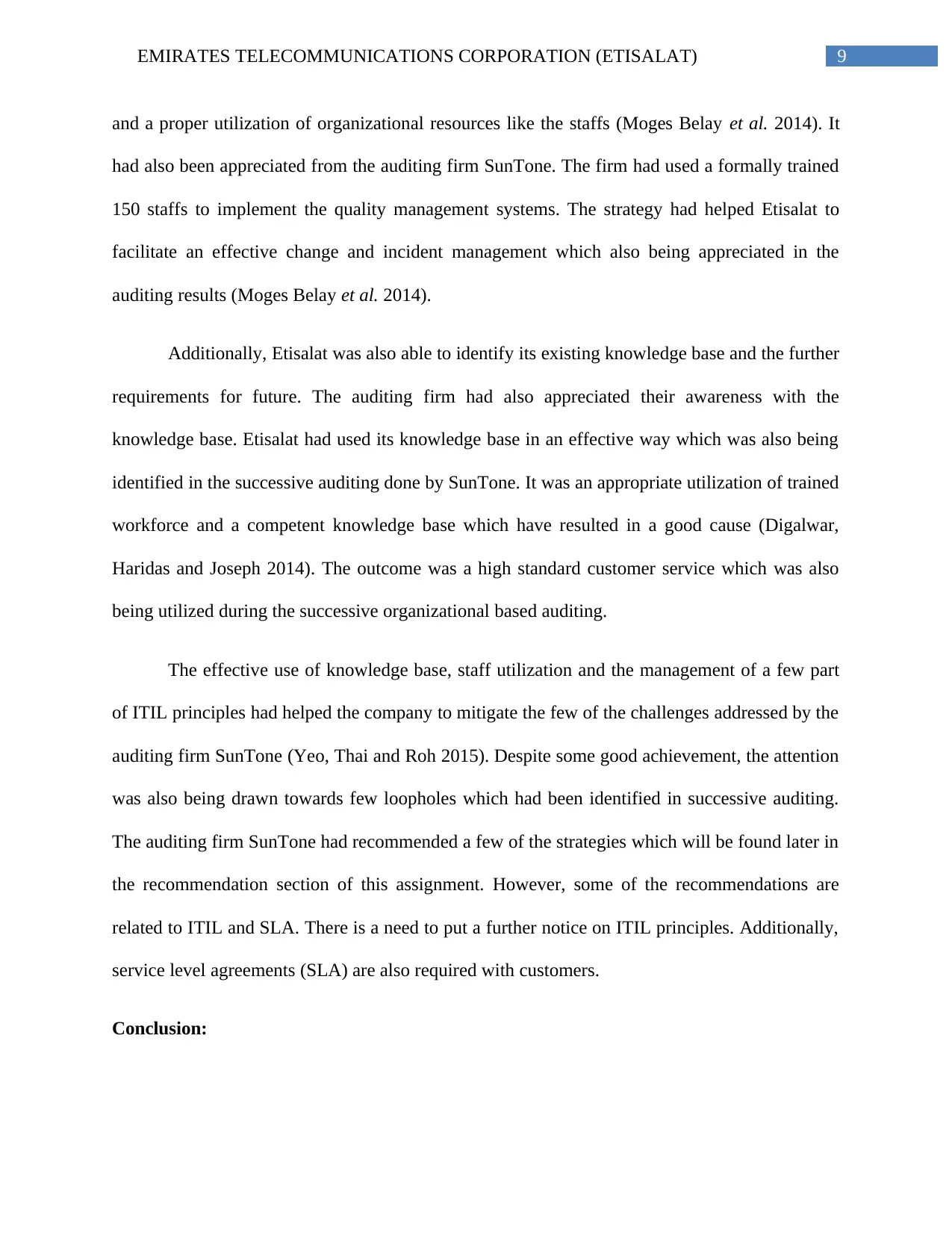
9EMIRATES TELECOMMUNICATIONS CORPORATION (ETISALAT)
and a proper utilization of organizational resources like the staffs (Moges Belay et al. 2014). It
had also been appreciated from the auditing firm SunTone. The firm had used a formally trained
150 staffs to implement the quality management systems. The strategy had helped Etisalat to
facilitate an effective change and incident management which also being appreciated in the
auditing results (Moges Belay et al. 2014).
Additionally, Etisalat was also able to identify its existing knowledge base and the further
requirements for future. The auditing firm had also appreciated their awareness with the
knowledge base. Etisalat had used its knowledge base in an effective way which was also being
identified in the successive auditing done by SunTone. It was an appropriate utilization of trained
workforce and a competent knowledge base which have resulted in a good cause (Digalwar,
Haridas and Joseph 2014). The outcome was a high standard customer service which was also
being utilized during the successive organizational based auditing.
The effective use of knowledge base, staff utilization and the management of a few part
of ITIL principles had helped the company to mitigate the few of the challenges addressed by the
auditing firm SunTone (Yeo, Thai and Roh 2015). Despite some good achievement, the attention
was also being drawn towards few loopholes which had been identified in successive auditing.
The auditing firm SunTone had recommended a few of the strategies which will be found later in
the recommendation section of this assignment. However, some of the recommendations are
related to ITIL and SLA. There is a need to put a further notice on ITIL principles. Additionally,
service level agreements (SLA) are also required with customers.
Conclusion:
and a proper utilization of organizational resources like the staffs (Moges Belay et al. 2014). It
had also been appreciated from the auditing firm SunTone. The firm had used a formally trained
150 staffs to implement the quality management systems. The strategy had helped Etisalat to
facilitate an effective change and incident management which also being appreciated in the
auditing results (Moges Belay et al. 2014).
Additionally, Etisalat was also able to identify its existing knowledge base and the further
requirements for future. The auditing firm had also appreciated their awareness with the
knowledge base. Etisalat had used its knowledge base in an effective way which was also being
identified in the successive auditing done by SunTone. It was an appropriate utilization of trained
workforce and a competent knowledge base which have resulted in a good cause (Digalwar,
Haridas and Joseph 2014). The outcome was a high standard customer service which was also
being utilized during the successive organizational based auditing.
The effective use of knowledge base, staff utilization and the management of a few part
of ITIL principles had helped the company to mitigate the few of the challenges addressed by the
auditing firm SunTone (Yeo, Thai and Roh 2015). Despite some good achievement, the attention
was also being drawn towards few loopholes which had been identified in successive auditing.
The auditing firm SunTone had recommended a few of the strategies which will be found later in
the recommendation section of this assignment. However, some of the recommendations are
related to ITIL and SLA. There is a need to put a further notice on ITIL principles. Additionally,
service level agreements (SLA) are also required with customers.
Conclusion:
Paraphrase This Document
Need a fresh take? Get an instant paraphrase of this document with our AI Paraphraser
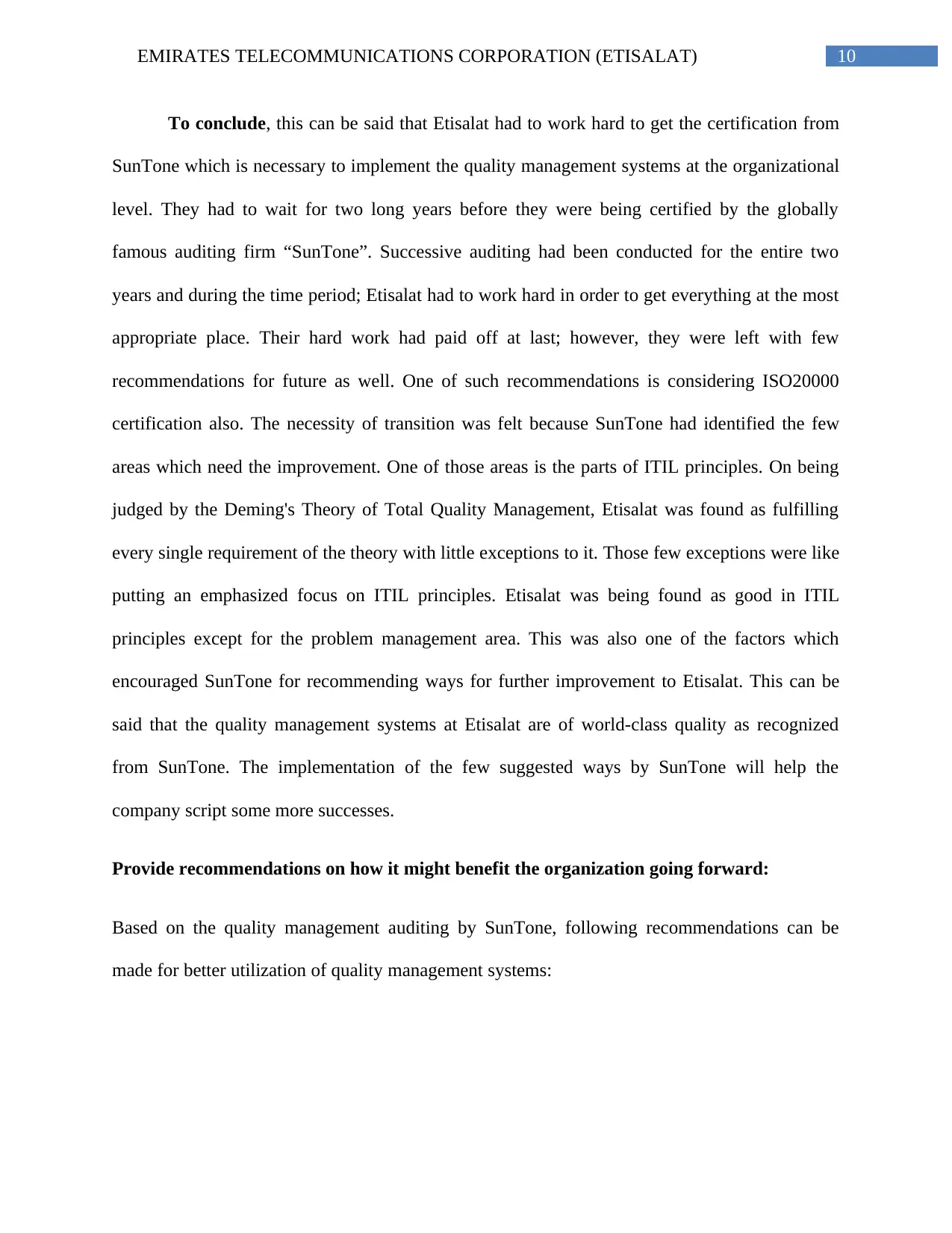
10EMIRATES TELECOMMUNICATIONS CORPORATION (ETISALAT)
To conclude, this can be said that Etisalat had to work hard to get the certification from
SunTone which is necessary to implement the quality management systems at the organizational
level. They had to wait for two long years before they were being certified by the globally
famous auditing firm “SunTone”. Successive auditing had been conducted for the entire two
years and during the time period; Etisalat had to work hard in order to get everything at the most
appropriate place. Their hard work had paid off at last; however, they were left with few
recommendations for future as well. One of such recommendations is considering ISO20000
certification also. The necessity of transition was felt because SunTone had identified the few
areas which need the improvement. One of those areas is the parts of ITIL principles. On being
judged by the Deming's Theory of Total Quality Management, Etisalat was found as fulfilling
every single requirement of the theory with little exceptions to it. Those few exceptions were like
putting an emphasized focus on ITIL principles. Etisalat was being found as good in ITIL
principles except for the problem management area. This was also one of the factors which
encouraged SunTone for recommending ways for further improvement to Etisalat. This can be
said that the quality management systems at Etisalat are of world-class quality as recognized
from SunTone. The implementation of the few suggested ways by SunTone will help the
company script some more successes.
Provide recommendations on how it might benefit the organization going forward:
Based on the quality management auditing by SunTone, following recommendations can be
made for better utilization of quality management systems:
To conclude, this can be said that Etisalat had to work hard to get the certification from
SunTone which is necessary to implement the quality management systems at the organizational
level. They had to wait for two long years before they were being certified by the globally
famous auditing firm “SunTone”. Successive auditing had been conducted for the entire two
years and during the time period; Etisalat had to work hard in order to get everything at the most
appropriate place. Their hard work had paid off at last; however, they were left with few
recommendations for future as well. One of such recommendations is considering ISO20000
certification also. The necessity of transition was felt because SunTone had identified the few
areas which need the improvement. One of those areas is the parts of ITIL principles. On being
judged by the Deming's Theory of Total Quality Management, Etisalat was found as fulfilling
every single requirement of the theory with little exceptions to it. Those few exceptions were like
putting an emphasized focus on ITIL principles. Etisalat was being found as good in ITIL
principles except for the problem management area. This was also one of the factors which
encouraged SunTone for recommending ways for further improvement to Etisalat. This can be
said that the quality management systems at Etisalat are of world-class quality as recognized
from SunTone. The implementation of the few suggested ways by SunTone will help the
company script some more successes.
Provide recommendations on how it might benefit the organization going forward:
Based on the quality management auditing by SunTone, following recommendations can be
made for better utilization of quality management systems:
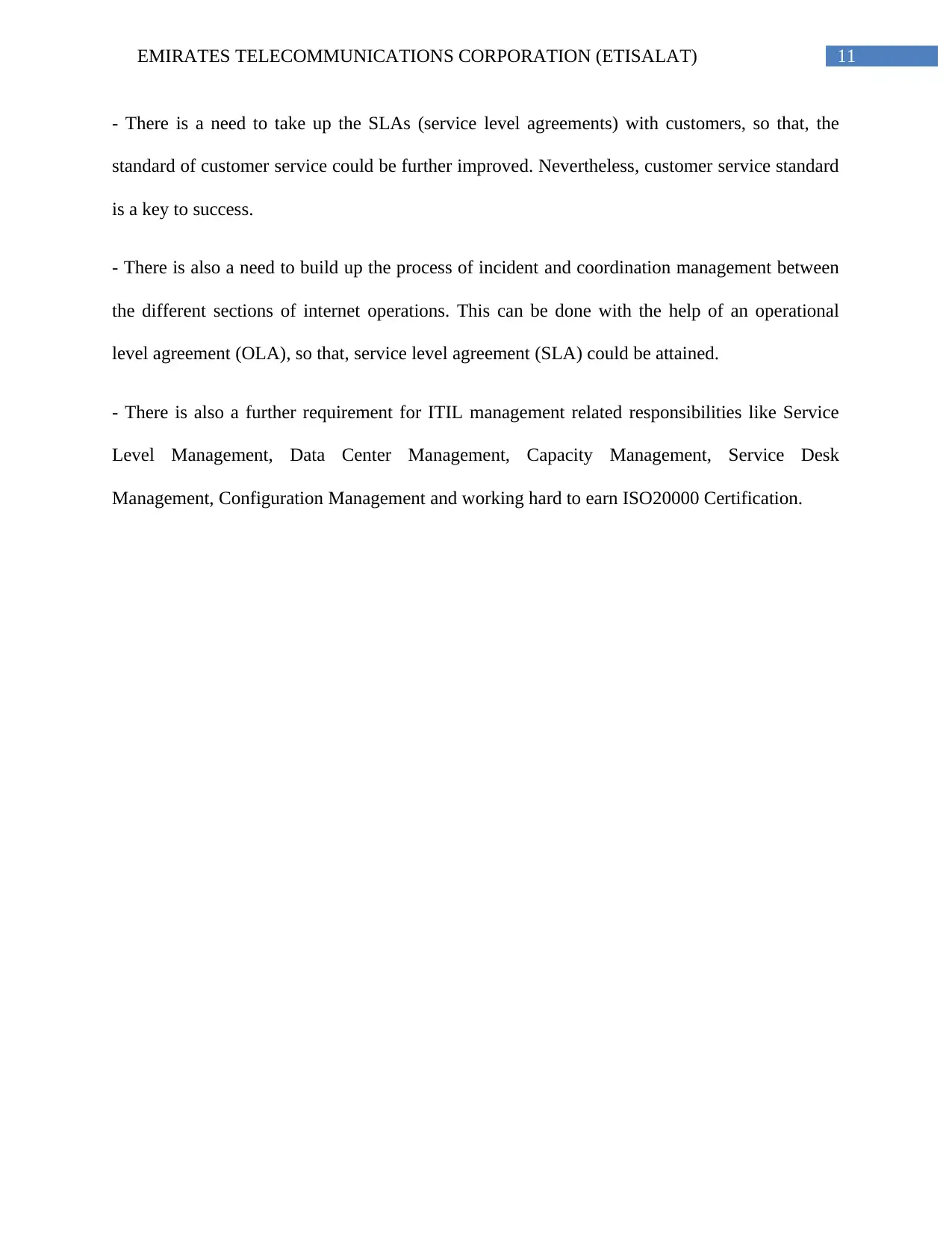
11EMIRATES TELECOMMUNICATIONS CORPORATION (ETISALAT)
- There is a need to take up the SLAs (service level agreements) with customers, so that, the
standard of customer service could be further improved. Nevertheless, customer service standard
is a key to success.
- There is also a need to build up the process of incident and coordination management between
the different sections of internet operations. This can be done with the help of an operational
level agreement (OLA), so that, service level agreement (SLA) could be attained.
- There is also a further requirement for ITIL management related responsibilities like Service
Level Management, Data Center Management, Capacity Management, Service Desk
Management, Configuration Management and working hard to earn ISO20000 Certification.
- There is a need to take up the SLAs (service level agreements) with customers, so that, the
standard of customer service could be further improved. Nevertheless, customer service standard
is a key to success.
- There is also a need to build up the process of incident and coordination management between
the different sections of internet operations. This can be done with the help of an operational
level agreement (OLA), so that, service level agreement (SLA) could be attained.
- There is also a further requirement for ITIL management related responsibilities like Service
Level Management, Data Center Management, Capacity Management, Service Desk
Management, Configuration Management and working hard to earn ISO20000 Certification.
⊘ This is a preview!⊘
Do you want full access?
Subscribe today to unlock all pages.

Trusted by 1+ million students worldwide
1 out of 14